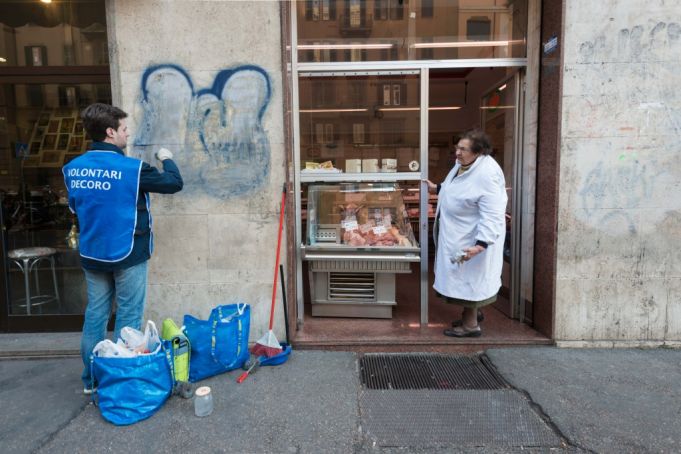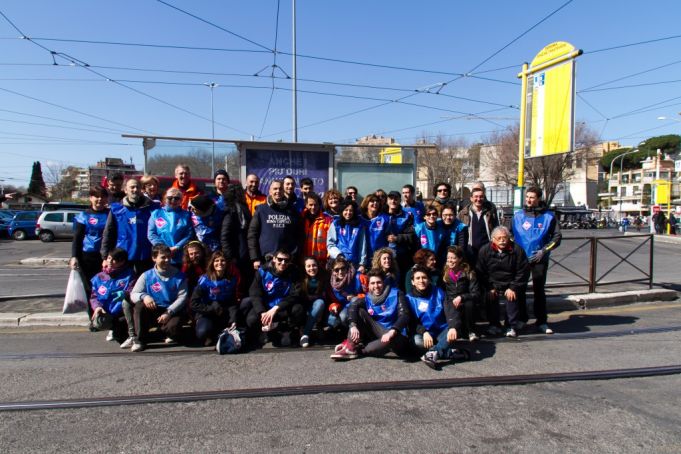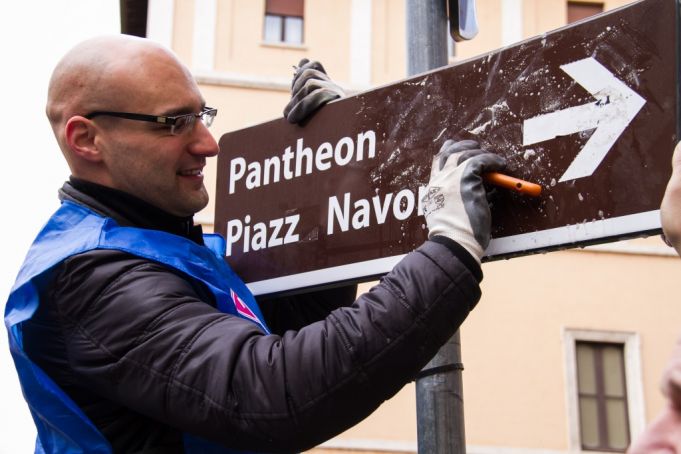Retake Roma cleans up the city
Volunteers take matters into their own hands to combat Rome's vandalism and neglect.
Stazione Trastevere at 09.00. Five dozen people who have pulled themselves out of bed on a Saturday morning are milling around the car park in old jeans and blue smocks. One group is picking up litter while a landscaping team is at work on the greenery near the cement staircase. Nearby, two people are applying a fresh coat of paint to an old rubbish bin. Meanwhile a camera crew from online news station CNO-WebTV is interviewing the activists, and there are at least two other independent reporters. The event is Retake Stazione Trastevere, and it's only the first project of the day for community service group Retake Roma.
Today's turnout is about 75 per cent Italian with the other quarter made up from the city's expat community. They range from teenagers to people in their 60s, all united by a sense of civic pride and community spirit.
Though Retake Roma has been active for five years, in recent months it has been receiving more and more publicity. The group's efforts to refresh and restore neighbourhoods throughout the city is a breath of fresh air for those who are sick of seeing one of the world's most beautiful cities consistently tarnished by waste, vandalism and neglect.
On arriving, volunteers are given rubber gloves and a brush and set to work on scrubbing graffiti off the wall in front of Teatro Verde across the street. Among them is Virginia Vitalone, a young journalist and press officer for the group.
“First we apply a gel remover, then let it sit for ten minutes,” she explains. “Then we can scrub it off with a wire brush. For bigger surfaces like this one, we use a pressure washer.” The gel removers are bought in bulk from A.G.E.P., a company that has been partnering with Retake Roma for the last few months. At the moment the organisation only has three pressure washers for its 70 groups, which it lends around as needed. When the group is helped by AMA, the municipal cleaning force, it is allowed to share AMA's power-washing equipment.

Moving a little further up the street, volunteers are given paint rollers and start applying a fresh coat of bluish grey to the wall. Overseeing their efforts is Simone Vellucci, the president of Retake Roma. Vellucci is young, charismatic and engaging. He explains that it was regard for the city on behalf of people who aren't necessarily from here that inspired them to name the group Retake Roma.
“We wanted the name to have both an Italian component and an English component to communicate that we're open to anyone who cares about the city,” he says. “We believe that Rome belongs to all of humanity.”
A former law student at Università Roma Tre, he was introduced to Retake Roma, and community service in general, by his American professor Rebecca Spitzmiller. “I know that in the US, community service is a big part of high school and college,” he says. “Growing up in Italy I wasn't exposed to it until I met Rebecca.”

Speaking a few days after the event, Spitzmiller recounted the full Retake Roma story. It began in 2010, she explains, just outside her front door. She had been growing increasingly dismayed over the graffiti tags that covered her apartment building (which included swastikas and phallic symbols), and even more dismayed over the general apathy of her friends and neighbours. One day she did a Google search for “graffiti removal” and found an easy recipe involving generic household solvent. Over the course of a week, she and her teenage son spent a couple of hours every afternoon removing tags from the travertine columns in front of her house.
The effort cost them a grand total of €48. She later learned from the administrator of her building that, had he requested a professional cleaning of the columns, it would have cost €10,000.
With the help of a few girlfriends and a handful of young volunteers from her son's former school, Spitzmiller organised a team. She began to teach a class in civic education on a voluntary basis at the Istituto Cristo Re school, meeting with a group of students every Thursday afternoon for two months. Soon the head of a local parish gave them permission to clean their church, and the group staged their first official event. Retake Roma was born.
The exponential rate at which Retake has grown calls into question the notion that Romans are apathetic about their city. On the contrary, it seems that Spitzmiller and her crew have tapped into a reservoir of community-mindedness. Since 2010 Retake has divided into 70 locally-based groups throughout Rome, each with their own organisational force, and its Facebook page has received over 22,000 likes. In addition to its own workforce, it has successfully partnered and collaborated with other volunteer groups throughout the city. The last half hour of Retake Stazione Trastevere is spent painting lamp posts. Among the volunteers are Neal Huddon-Cossar and Garnett Bruce, two members of Grassroots, an environmentalist group from John Cabot University.
Spitzmiller says the biggest challenge facing the group is teaching people that it's not a lost cause, and that restoring your neighbourhood is not a single act but an ongoing process.
“Rome wasn't built in a day, it wasn't tarnished in a day, and it won't be restored in a day,” she says. “If you clean that tag off your building, it will probably only come back a few times, and with increasingly lower frequency. The other problem we have is getting local police to enforce existing laws on vandalism that prohibit illegal advertising and putting stickers on signs, tracking down those responsible and actually fining them.”

Indeed. A significant part of Retake's protocol is fighting against the excessive plastering of posters all over town, as much of it is done without the permission of the city or the property owners, to say nothing of the environmental damage generated by the waste. Also of concern is the work of street artists like Clet Abraham, known for adding stickers to traffic signs, of which Retake is vehemently opposed.
“We have nothing against Abraham personally,” Vellucci says. “Retake Roma defends and promotes the value of street art (and all other forms of legitimate art expression) as an excellent means of urban transformation.” He explains that the group could appreciate the serendipity and originality of Abraham's works, if only he didn't create them in ways that violate laws protecting public property and individual safety. “In some cases,” he explains, “the changes he makes on traffic signage can even alter their legibility, or at least distract drivers, thus creating potential safety risks.”
Velluci argues that Retake Roma goes to great lengths to stop illegal advertising in the form of abusive stickers and signs, and that it would be hypocritical to allow anyone to claim public space without permission in the name of artistic talent, yet forbid people from using public space to promote commercial activity.
Speaking from personal experience, having lived as a guest in Rome for six years, nothing has made me feel more like a part of the city than taking an active role in its restoration. I'll see you at the next event. Bring gloves.
Jonathan Balog
SIDE NOTES
Retake Roma is composed of over 70 localised groups throughout the city, comprising members of all ages and backgrounds.
Information on upcoming projects in your neighbourhood and a list of useful cleaning materials can be found on the Retake Roma website, its Facebook page and its Twitter feed.
This article was published in the September edition of Wanted in Rome magazine.


















